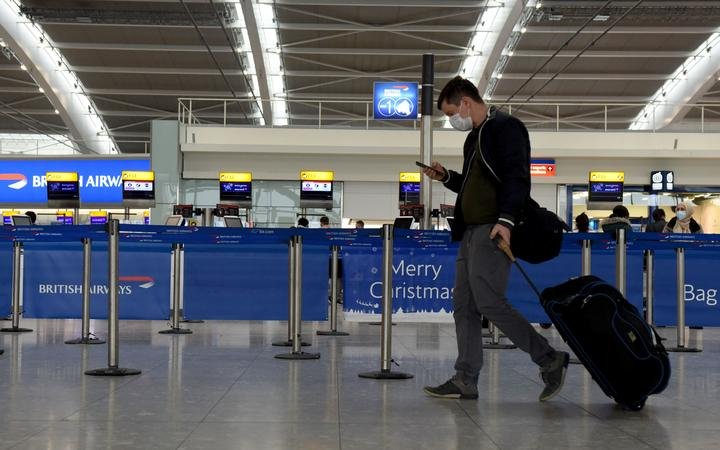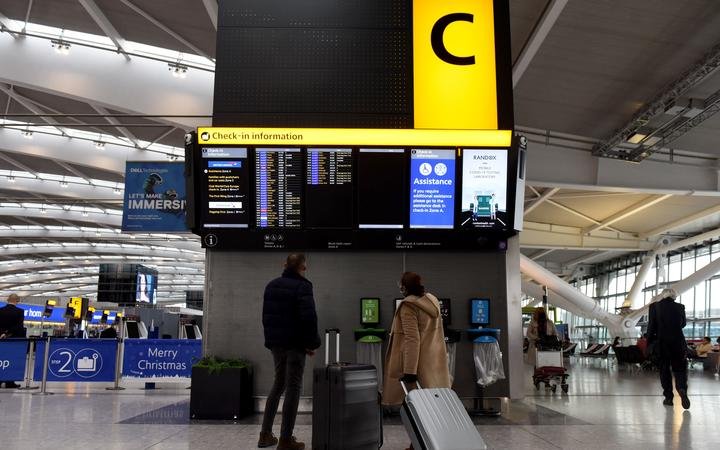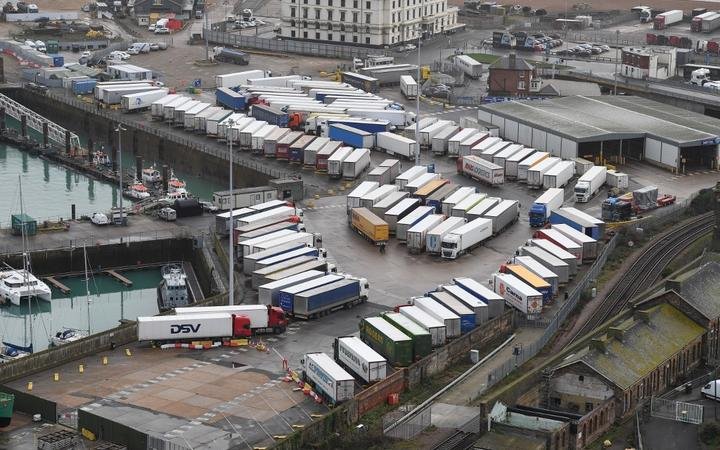EU urges countries to lift UK travel bans
European Union ambassadors are meeting to try to co-ordinate their policies on links to the UK, after dozens of countries suspended travel amid alarm over a new coronavirus variant.

A traveller at a nearly deserted Terminal 5 at Heathrow Airport. Photo: AFP
They will consider a recommendation from the European Commission to lift restrictions.
But EU member states are free to set their own rules on border controls and may continue with their own policies.
France and the UK are trying to reach a deal to end disruption in the Channel.
The new variant appears to be more transmissible, but there is no sign it is more deadly.
Britain has reported a record number of new cases of Covid-19 in a single day as it battles a surge in infection caused by the variant strain of the disease.
Official figures show there were 36,804 new cases and another 691 deaths within 28 days of a positive test – both figures up markedly from a day before.
The figures were released as almost all the EU’s 27 member states began blocking travellers from the UK.
The EU’s executive branch, the European Commission, recommended its members allow people to travel to their country of residence providing they take a Covid-19 test or self-isolate. But it said non-essential travel should be discouraged.

Travellers look at the departures board at Terminal 5 of Heathrow Airport in west London. Photo: AFP
It also said transport staff, such as lorry drivers, should be exempt from all travel restrictions and mandatory testing.
EU ambassadors are considering adopting the rules but despite this countries are likely to continue with their own policies, the BBC’s Gavin Lee reports from Brussels.
Meanwhile, more than 1500 lorries are stuck in Kent in south-east England as UK and French leaders try to reach an agreement on reopening the French border. Some countries, such as Spain, Portugal and Hungary, are only allowing their residents to return home.
As the list of countries imposing travel restrictions on the UK grew, the World Health Organisation’s (WHO) Europe director, Hans Kluge, said member states would convene to discuss strategies and limit travel, while maintaining trade.

Some of the lorries in the queue at the port of Dover. Photo: AFP
WHO emergencies chief Mike Ryan said new strains were a normal part of the evolution of a pandemic, and that it was not “out of control”, contradicting earlier remarks in the UK from Health Secretary Matt Hancock.
The co-founder of BioNTech, producer with Pfizer of the vaccine now being used in the UK, also voiced optimism. “Scientifically, it is highly likely that the immune response by this vaccine also can deal with the new virus variant,” Ugur Sahin said. He added that, if needed, a mutation-beating vaccine could be provided within six weeks.
What’s happening in Europe?
France imposed a ban on passengers and freight from the UK, causing disruption at the key southern British port of Dover.
UK Prime Minister Boris Johnson said he was working with French President Emmanuel Macron to resume trade, and that he hoped the issue would be resolved “as soon as possible”.
French Transport Minister Clément Beaune said his country would announce what would replace the initial 48-hour ban on travellers and lorries on Tuesday.
Beaune said proof of a negative Covid test for anyone arriving from the UK would be a certainty.
Lorry drivers spent a second night sleeping in their cabs outside Dover on the M20 motorway, which has been shut since Sunday night.
Andrew Opie of the British Retail Consortium told the BBC the lorries must get moving again from Wednesday to avoid supply disruption in the UK.
“There is a problem potentially directly after Christmas and that is really in fresh produce,” he said. “So we’re talking here about things like salad, vegetables, fresh fruit, of which the vast majority comes from Europe at this time.”
A French supermarket chain warned of potential seafood shortages. “We have trucks stuck on the other side of the border… with products that we are expecting for the holiday season: fish and seafood,” Dominique Schelcher, the head of supermarkets at Système U, told BFMTV.
Meanwhile, Japanese car giant Toyota said it had suspended production in two factories in the UK and one in France. It blamed “shortages of parts due to transport delays and the uncertain nature of the duration of the border closures”.
Sweden banned foreign travellers from Denmark overnight into Tuesday after cases were discovered there. The decision alarmed Danes – especially those on the island of Bornholm, which relies on a fast ferry link with Ystad in Sweden. There are fears that many will struggle to get to or from Bornholm in time for Christmas, Danish media report.
There was some better news from the continent on Monday, with the EU’s medicines regulator approving the Pfizer-BioNTech vaccine, paving the way for jabs to be given as early as Sunday.
And in the rest of the world?
Many other countries, from India, to Iran, to Canada have suspended flights from the UK.
The US already has restrictions in place that prevent most non-US citizens who have been in the UK and some other countries for the last 14 days from entering. It is yet to follow suit with a ban on all travellers from the UK, but two airlines – British Airways and Delta – will only allow passengers who test negative for the coronavirus to fly to New York’s John F Kennedy airport.
Saudi Arabia, Kuwait and Oman have shut their borders completely to international passengers.
Along with Denmark, the new strain has also been detected in Australia, Italy and the Netherlands.
Some experts believe the new strain has already spread beyond where it has been reported, crediting the UK’s use of genomic surveillance for detecting it.
“I think we will find in the coming days that a lot of other countries will find it,” Marc Van Ranst, a virologist from the Rega Institute for Medical Research in Belgium, told broadcaster VRT.
In another development, travellers from South Africa are also facing bars from some countries after another new variant of the virus was discovered that is unrelated to the one found in the UK.
– BBC
